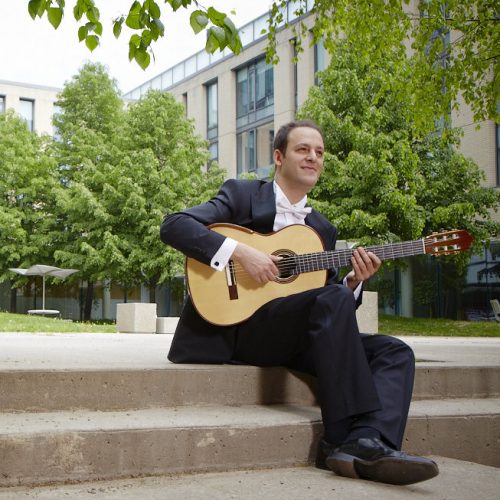Tariq Harb

Tariq Harb
Alumnus, Doctor of Musical Arts (2014), Music Performance
“I have matured as a performer and as a thinker.”
I am originally from Amman, Jordan, born to parents of Palestinian origin. Following high school, I moved to Canada to pursue university studies.
I started playing classical guitar halfway through my undergraduate studies in violin performance at Concordia University in Montréal. I became fascinated with what the classical guitar could accomplish in terms of polyphony and counterpoint — the guitar’s ability to play more than one melodic line simultaneously.
As my interest for this instrument grew, I asked about studying both violin and guitar at the undergraduate level. Thankfully, I was granted permission and that is when my journey with the classical guitar started.
During the summer of 2009, I attended a guitar festival in Cervo, Italy. There, I met Professor Jeffrey McFadden, my current teacher and supervisor, who was giving lessons and master classes. We discussed the possibility of my pursuing a doctoral degree. I completed my master’s in Classical Guitar Performance at McGill University and moved to Toronto the following year. Currently, I am completing a Doctor of Musical Arts (DMA) degree in Classical Guitar Performance at U of T.
Studying with Professor McFadden has been extremely helpful to my personal development as a musician and also to my career. I have matured as a performer and as a thinker during my current studies. Moreover, U of T’s guitar program, along with Toronto’s guitar society, invite numerous world-class guitarists to perform and to conduct master classes in Toronto. This is an invaluable quality in a guitar program; it allows students to stay connected with the current classical guitar circuit and to receive constructive insight on their playing from other world-class performers.
Following graduation, I plan to organize a tour in the Middle East to share my love for the guitar. I also want to teach in Canada, the United States, and Europe, and to create a guitar program in an institution where such a program does not exist. Furthermore, I want to continue participating in competitions and festivals around the world. I have a few recording projects in mind. There are many projects to fulfil!
My advice to prospective DMA students is that it is absolutely normal to feel torn between being a performer and a researcher. You have to master balancing both mindsets. It can be difficult to strike a balance, but this balance becomes achievable once it is understood as a vital requirement to reap benefits from such a program.
The key to meeting deadlines is to stick to a strict personal schedule of practising and researching. You will be required to perform on numerous occasions in master classes, class concerts, and solo recitals; you will also be required to present papers, attend research classes, form a committee, and research a specific thesis topic.
Another piece of advice is to take your time choosing a thesis topic that you are truly interested in. Start thinking of a research topic early on.
